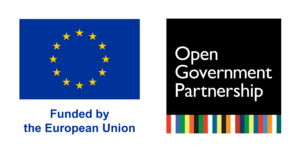Faces of Open Government: Sammy Obeng
Meet Sammy Obeng, Executive Director of Parliamentary Network Africa. This month, Sammy sheds light on the collaborative work to implement Ghana’s landmark Right to InformationThe legal right to request information from the government allows the public to follow government decision-making, participate in ensuring better decisions, and hold the government accountable. Techni... law and underscores the importance of open parliaments and the interconnectedness of the open government community in driving impactful reforms.
Access to information is a cornerstone of transparencyAccording to OGP’s Articles of Governance, transparency occurs when “government-held information (including on activities and decisions) is open, comprehensive, timely, freely available to the pub... More and accountability. Could you share specific examples from your advocacy work on Ghana’s Right to Information law and how it has enhanced democracy?
The advocacy for the passage of Ghana’s Right to Information law spanned over two decades, with several versions of the Bill moving in and out of the Parliament of Ghana with the support of civil society.
I joined the civil society advocacy on the Bill in my capacity as Executive Director of Parliamentary Network Africa (PNAfrica). As an organization that monitors daily proceedings in the Parliament of Ghana and tracks the status of legislations before the House, the civil society organization (CSO) RTI Coalition considered PNAfrica an important partner in ensuring that stakeholders would be informed about the Bill’s progress. To this end, I led the daily monitoring of the Bill and provided regular updates of ‘tracked versions’ of the Bill, highlighting new amendments made by Members of Parliament supporting or opposing the Bill. I also created strategies for engagements with Parliament to push for the changes CSOs were calling for and acted as the advisor to the RTI Coalition on Parliamentary practice and procedure for effective legislative advocacy. These efforts, along with the work of other CSOs, contributed to the success of passing the Bill into law in 2019. Prior to joining the civil society RTI law passage advocacy, one of the biggest challenges of the Coalition was figuring out how to effectively monitor the daily proceedings of parliament and track the Bill at every stage of the lawmaking process in real time. We leveraged the structures of PNAfrica to make this challenge a thing of the past.
Following the passage of the law, I led the effort to document the lessons learnt throughout the advocacy journey to inform future legislative advocacy as Ghana’s democracy grows. To this end, I authored the book The Right to Information: Ghana’s Journey (1992-2019) and led the production of a documentary on the same, both under the auspices of the Commonwealth Human RightsAn essential part of open government includes protecting the sacred freedoms and rights of all citizens, including the most vulnerable groups, and holding those who violate human rights accountable. T... Initiative (Africa Office).
Your leadership in the Media Coalition on Right to Information highlights the importance of civil society engagement in advancing access to information. How do you see civil society organizations collaborating with governments and the private sectorGovernments are working to open private sector practices as well — including through beneficial ownership transparency, open contracting, and regulating environmental standards. Technical specificat... More to ensure the effective implementation of RTI laws?
The Media Coalition on Right to Information was born at an event to mark International Day for Universal Access to Information in 2018. Stakeholders in the RTI law advocacy space expressed frustration that after two decades of advocacy, no law on Right to Information had been passed to operationalise the provision of the Constitution of Ghana that guarantees the people’s right to information.
In that meeting, we realized that our friends in the media have often been limited to reporting on activities and press statements coming out of the civil society coalition without a special effort of making them an integral part of advocacy. We limited the media simply to being the “vuvuzela that trumpeted our actions” (as I like to put it), and that certainly needed to change. We therefore conceived the idea to set up a media-led vehicle that would be in the forefront of the advocacy, and I was privileged to be given the opportunity to lead this effort as Head of the Secretariat for the Media Coalition on RTI. Within weeks, we had brought together hundreds of journalists from across the country whose capacities were built on the importance of an RTI regime. Our friends in the media used the power of their pens and the lenses of their cameras to zoom in on the advocacy. They supported efforts for a weekly ‘RTI Red Friday’ where we all wore red attire and used their various media platforms to speak about the Bill in Parliament and the need to pass it.
In 2019, just after the RTI Bill was passed, I was appointed the spokesperson of a Civil Society Right to Information Implementation Committee that developed a strategic plan on how to monitor, support, and improve the implementation phase. I have been subsequently elected Vice Chairperson of the national RTI Coalition to lead the efforts on institutional relations towards the full implementation of the law. Our initiatives included creating simplified versions of the law for public dissemination, utilizing various online and offline platforms for civic educationAccountability within the public education system is key to improving outcomes and attainment, and accountability is nearly impossible without transparent policies and opportunities for participation .... We have also supported the efforts at setting up the RTI Commission—the ombudsman established under the law—and provided technical assistance to the Commission, including helping finalise subsidiary legislationCreating and passing legislation is one of the most effective ways of ensuring open government reforms have long-lasting effects on government practices. Technical specifications: Act of creating or r... to further operationalise the implementation of the law.
Can you explore your work with the Parliamentary Network Africa and any specific countries with wins?
Parliamentary Network Africa (PNAfrica) is a convenor and connector of civil society parliamentary monitoring organisations across Africa, with a vision of promoting open parliaments on the continent. Our initiative to launch an Africa Open Parliament Index (OPI) in 2022 has proven to be a game changer in getting African legislatures to think more deeply about openness. The OPI, designed to be released once every two years, measures the level of transparency, accountability and citizens participation in the work of African parliaments. This biennial ranking provides the assessed parliaments with recommendations on how to improve their level of openness and showcases positive examples from peer African parliaments for mutual learning. Beyond the assessment, PNAfrica supports civil society networks involved in parliamentary monitoring and engagements in each country to work with the national parliaments to co-create reforms that makes the legislature more open and helps to improve their scoring in the next OPI.
The 2022 edition of the Index assessed 13 countries in West Africa (including 6 OGP member countries), and has contributed to some transformative changes in the parliaments of these countries. For example, CSOs and parliaments in Côte d’Ivoire, Niger, and Togo now have regular platforms for engagements, which was not the case before the OPI processes. In the parliaments of Ghana and Sierra Leone, full internal structures have been put in place for better working relationships between parliaments and CSOs, through the establishment of the Citizens Bureau and the Parliament-CSO Network respectively. This year, the latest OPI will assess more countries in East, West and Southern Africa, with the hope to cover about two-thirds of the national parliaments in Africa.
To ensure the sustainability of these gains, we have pushed the Africa Parliamentary Monitoring Organisations Network (APMON) and the Africa Parliamentary Press Network, towards keeping the momentum within journalists and parliamentary monitoring organisations to push for more openness in African legislative assemblies. We continue to explore opportunities to advance Open Parliaments, and have succeeded in embarking on raising awareness with the Pan-African Parliament (PAP) and commenced conversations with the Economic Community of West African States (ECOWAS) Parliament and the Southern Africa Development Community Parliamentary Forum (SADC-PF). We look forward to a period where the PAP, ECOWAS Parliament, SADC-PF, and their member parliaments embrace the principles of open parliamentEnsuring access to legislative information and creating mechanisms for public participation are critical to building an open, trusting relationship with citizens. Technical specifications: Commitments... More as an integral part of the work they do.
As a member of the Africa and Middle East Cohort of OGP’s Open Government Leadership Collaborative (OGLC), your project in Ghana’s Parliament contributed to advancing reforms in the national action planAction plans are at the core of a government’s participation in OGP. They are the product of a co-creation process in which government and civil society jointly develop commitments to open governmen.... How do you believe initiatives like this align with OGP’s new strategy, particularly in building a more interconnected community of open government reformers?
At the time, the actions to be undertaken by parliament in Ghana’s 4th National Action Plan had not seen much progress, and I committed to leverage my working relationship and understanding of the parliament through my work as Executive Director of PNAfrica to help eliminate the bottlenecks. My OGLC project was therefore to “support in unblocking the constraints in implementation of the commitmentOGP commitments are promises for reform co-created by governments and civil society and submitted as part of an action plan. Commitments typically include a description of the problem, concrete action... through leveraging my working relationship with the parliament of Ghana to improve engagements between civil society players in the OGP process and parliamentary actors.”
Appreciating that Ghana’s legislature had a civil society-friendly Speaker of Parliament, we set off on a mission to create awareness about OGP and its value proposition to Parliament so the House can appreciate the benefits of thinking along the lines of open gov and Open Parliament. This was well embraced, and our technical assistance contributed to the creation of an office in parliament to coordinate OGP work. This paved the way for an Open Parliament Action Team already set up in Parliament to become more active, leading to activities such as sending a high-powered delegation to the OGP Summit in Tallinn that was led by a Deputy Speaker of Parliament. We also worked with Parliament to develop an Open Parliament Action Plan, establish an OGP Caucus in Parliament, and worked on completing all other commitments in the 4th NAP, leading to the development of new parliamentary commitments for the 5th NAP.
Truly, the OGLC’s approach of deliberately developing reformers by providing us with knowledge, tools, and insights from across the world helps in unleashing the power and urgency in taking steps towards better open governance. This certainly will be an important component of OGP’s new strategy if sustained and upscaled. To my mind, OGP and its vision stays alive when individual champions see reason to go out of their way to lead and support transformative actions
This year’s Open Gov Week theme is the Open Gov Challenge, which emphasizes the need for ambitious reforms in key areas such as access to information, and civic space. What innovative approaches do you think need to be adopted by governments and parliaments to address challenges and how can these be used within the OGP community to inspire others?
I believe that country contexts matter in this open gov journey, and governments (including parliaments) should be encouraged to better appreciate the importance of the co-creation approach with civil society as important to addressing challenges. By the nature of our work as civil society, we often are closer to the people across the length and breadth of countries and have a good appreciation of the challenges they face. When governments and parliaments co-create and co-implement better with folks from civil society, many success stories can be gleaned, which can always serve as sources of inspiration for others within the OGP community.

This edition of Faces of Open Government was supported by the European Union.
Comments (1)
Leave a Reply
Related Content

Open Gov Week 2024
As the world faces a host of crises, join hundreds of reformers around the world - in government and civil society - who are working to make their communities stronger,…
 Challenges and Solutions
Challenges and Solutions Announcing the Open Government Leadership Collaborative
The Open Government Leadership Collaborative (OGLC) pilot program sought to enhance the leadership capacity of reformers within the context of their work. As the program expands...

Ghana
Ghana’s fourth action plan achieved notable early results in implementing the Access to Information Law and publishing information on companies’ beneficial owners. Gradual progress across action plans and increasingly strategic…


Gladys Estela Riveros Rojas Reply
“Por la naturaleza de nuestro trabajo como sociedad civil, a menudo estamos más cerca de las personas a lo largo y ancho de los países”. (Sic)
La base es la naturaleza de cuidarla y portegerla para poder llegar a un bienestar para todos, a fin de obtener un Crecimiento Económico y Desarrollo Social.